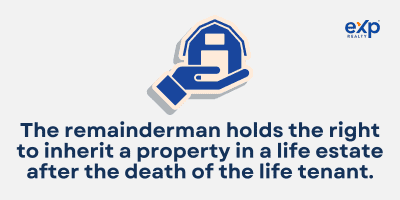Are you tired of hearing about estate planning and wondering what it all means? Are you tired of the legal jargon and confusing terminology? Well, you’re in luck. We will dive into life estates and what they mean for your property rights.
Understanding life estates can make a huge difference in planning for the future and protecting your assets. So get comfortable, and let’s explore the ins and outs of life estates together. By the end of this post, you’ll have a solid understanding of what life estates are, how they work, and what they mean for your property rights. Let’s get started.
What is Life Estate?
Now that we’ve got you settled in and comfortable let’s answer the question: What is a life estate? In simple terms, a life estate is a type of property ownership that allows an individual, known as the life tenant (the life estate owner), to use and occupy a property for the duration of their life.
When the death of life tenant occurs, the property ownership goes to another individual, the remainderman, also known as the beneficiary.
How Does A Life Estate Work?
For instance, if you’re considering setting up a trust for your assets, you may want to establish a life estate for a loved one who you want to benefit from your property during their lifetime. However, you also want to ensure it goes to someone else after they pass away.
Knowing how a life estate works will enable you to make well-informed choices regarding the distribution of your assets and fulfilling your goals.
Additionally, it’s crucial to comprehend the restrictions on your use and ownership of the property if you buy a property with an already established life estate. For instance, while the life tenant is still alive, you may be unable to sell the property or make significant alterations.
Life estates may seem minor but can significantly affect real estate ownership and planning. A clear understanding of what a life estate is, ensures your wishes are carried out as you desire.
Parties Involved in a Life Estate
A life estate typically involves two main parties: the life tenant and the remainderman. Each of these parties has a distinct role and rights to the property. Understanding the responsibilities and obligations of each party is crucial in ensuring a smooth transfer of ownership and avoiding potential conflicts.
In this section, we will explore the roles and responsibilities of each of these parties in a life estate.
The Life Tenant

First up, we have the life tenant. This person holds the right to use and enjoy a property during their lifetime in a life estate. They have a legal right to occupy and use the property but do not own it outright.
The life tenant is responsible for the property’s upkeep and maintenance during their tenure. They are also responsible for paying any property taxes and insurance premiums that may arise. The life tenant’s rights are limited to their lifetime; upon their death, the property owner will transfer to the remainderman.
Before entering into a life estate agreement, prospective life tenants should consider several factors to ensure it is the right decision for them. They should think about their future housing needs and whether the property will be suitable in the long term. They should also assess their financial situation and whether they will be able to afford the long-term care and maintenance of the property during their tenure.
The Remainderman

Next, we have the remainderman. This individual holds the right to inherit a property in a life estate after the death of the life tenant.
However, they do not have the right to use or occupy it during the life tenant’s lifetime. They also have no right to sell or dispose of the property during the life tenant’s lifetime.
The remainderman’s interest in the property passes down through a will or trust. Even if the remainderman has no rights to the property while the life tenant is alive, they eventually inherit it, so it’s still a pretty sweet deal.
It’s important to take into account several criteria while selecting a remainderman. First, the life tenant should trust the remainderman to work in their best interests and uphold the conditions of the life estate arrangement. This is particularly crucial since the remainderman has a significant financial interest in the property.
Second, it’s crucial to think about any possible tax repercussions of selecting a remainderman. Both the life tenant and the remainderman may be subject to estate or gift taxes, depending on the size and value of the real property. To assess these potential effects, it is advisable to speak with a tax professional.
The ability of the remainderman to maintain and manage the property following the death of the life tenant is another factor. This is crucial if the real property is a sizable or intricate asset, like a company or a farm. In these situations, it’s crucial to select a remainderman with the knowledge and tools required to manage the property efficiently.
Finally, it’s critical to confirm that the remainderman is prepared and willing to inherit the property. It is advised to have an open and honest conversation with potential remaindermen to ensure they are aware of the responsibilities of being appointed as such and are prepared to accept the obligations entailed.
How To Create A Life Estate
Crafting a life estate requires some key considerations and preparatory measures. It can be an intimidating process but it doesn’t have to be overwhelming. It’s important to keep in mind that every state has its own set of rules and regulations regarding life estates, so make sure you are aware of these before acting. Some steps to create life estates include:
- Before venturing forward with life estate planning, it’s essential to gain a clear understanding of what you wish to achieve for your family and assets. Refinancing should be one of the first steps taken when beginning this process, as it will become much more difficult to do once an estate is established.
- Consulting an attorney (or elder law attorney) and getting legal advice is a great way to evaluate the advantages and disadvantages of creating a life estate. Plus, it’s important to be aware of any laws in your state that pertain to this type of property ownership arrangement.
- To create a legally-binding life estate deed, certain information must be noted accurately. The documents include:
-
- The deed’s date
- Name and address of the individual granting the life estate
- Name and address of the grantee
- The life estate property’s description and address
- A document containing the preservation of a life estate to all parties involved and signed by each participant is necessary for this transaction.
The only way to make a life estate deed valid is by having it recorded with the local recorder of deeds in the town where the property resides. This task can typically be accomplished at a county recorder’s office.
Advantages of a Life Estate
A life estate can be a valuable tool in estate planning, providing several advantages to both the grantor and the beneficiaries. In this section, we will chat about some of the benefits of this unique property ownership arrangement.

Property Transfer While Keeping Homeownership Benefits
First, a life estate offers a means to transfer property to a designated person while preserving the right of the present owner to utilize the property during their lifetime.
Doing this has the dual benefit of allowing the existing owner to continue using their property and ensuring it transfers to someone they can trust and whom they wish to benefit from.
A life estate also offers the benefit of effective estate planning. The current owner can maintain control of the property while simultaneously securing a future transfer to a designated individual by establishing a life estate. This can be especially helpful when the current owner still needs to utilize the property throughout their lifetime but wishes to pass it down to a family member or close friend.
Tax Benefits
But wait, there’s more. A life estate may also provide some tax benefits. Since the property transfers during the tenant’s lifetime, it may avoid probate, which can save on probate fees and taxes. Additionally, the remainderman receives a “stepped-up” basis in the property’s value when transferred to them, which can reduce their tax liability upon the sale of the property.
Protection From Debtors and Creditors
A life estate also has the benefit of offering protection against creditors. Since the remainderman’s stake in the property won’t take effect until the life tenant passes away, a life estate may protect the property from the life tenant’s creditors. For those who have significant debts or are at risk of facing legal action, this could be very significant.
Prevent Heirs Disputes
A life estate can also be a valuable tool for preventing disputes among heirs. In many cases, disputes among heirs can arise after the death of a property owner, especially when there is no clear plan for the distribution of assets. By explicitly identifying the remainderman and guaranteeing that property is transmitted per the life tenant’s desires, a life estate can help prevent these disagreements.
Life Tenant Gets Control
A life estate can also give the life tenant some degree of control by allowing them to impose conditions on the property’s transfer, such as limitations on its usage or upkeep requirements. Doing this can help ensure the property will be used and maintained following the life tenant’s tastes and values.
Provides Peace of Mind
Finally, a life estate can provide peace of mind for the life tenant. It might be relieving and reassuring to know that the property will pass to a particular individual upon their death. It can also support the life tenant’s intentions by ensuring the property is used and maintained as desired.
Disadvantages of a Life Estate
We’ve talked about the advantages of a life estate, but with most things in life, there are also some potential drawbacks. Let’s examine some of these potential downsides in more detail.
Life Tenant Can’t Sell or Mortgage The Property
To begin with, a life estate restricts the present owner’s options for selling or financing the property. The life tenant is not permitted to sell or mortgage the property without the remainderman’s permission because they only have the right to use and occupy the property throughout their lifetime. As a result, the present owner may not be able to access the property’s full value, which may restrict the flexibility of their estate plan.
Potential Conflicts May Arise
Second, disputes or conflicts between the remainderman and the life tenant may arise due to life estate. Since both parties have ownership rights, conflicts may occur over the use and maintenance of the property. It can be especially problematic if the life tenant and remainderman have conflicting goals or visions for the property.
Life Estates Restrict Flexibility
Thirdly, a life estate may restrict the flexibility of the current owner’s estate plan. The transfer of the property may not consider changes in the owner’s circumstances or preferences because it is predetermined.
For example, if the owner of a life estate designated their adult child as the remainderman but later decided they wanted to leave the property to their grandchild instead, they would not be able to make that change without the remainderman’s consent.
Similarly, it does not allow changes to the property during the life tenant’s tenure. Therefore, if the current owner wants to make improvements or renovate the property, they need the remainderman’s consent.
Taxes Should Always be Up to Date
A life estate may also cause the property to be forfeited to the remainderman if the life tenant fails to keep up or pay its taxes. If the property falls into disrepair or the life tenant fails to pay property taxes, the remainderman may be entitled to take possession of the property.
The remainderman can file a petition with the court for possession of the property. The court may then order the life tenant to vacate the property, or it may order the sale of the property to satisfy any outstanding debts or taxes owed.
It’s worth noting that creating and managing a life estate can be complex and require the assistance of legal professionals, which can result in higher costs and fees. A life estate may be burdened by estate taxes, property taxes, and real estate taxes, and joint ownership may complicate matters.
Given all the things that could go wrong, working with a real estate agent who understands the ins and outs of an enhanced life estate deed, life estate property, and life estate agreement is essential.
A Real Estate Agent Can Help!

A good real estate agent can help you navigate the complexities of the process and guarantee that establishing your ownership rights and ownership transfers are done correctly. They can also offer helpful advice and tools to help you in managing the burden of estate taxes, property taxes, and real estate taxes.
So, while a life estate can be a powerful tool for transferring property and planning your estate, weighing its benefits and drawbacks is crucial before taking further action. Dealing with an experienced real estate agent can make a difference in your life estate’s success.
Key Takeaways
To recap: a life estate is a property ownership arrangement that allows a person to use and occupy a property for their lifetime before ownership reverts to the remainderman. It is a useful estate planning strategy that enables the transfer of ownership to a designated beneficiary while still allowing the current owner to utilize their property during their lifetime.
A life estate, however, may have disadvantages, such as restricting the present owner’s ability to sell or mortgage the property and the difficult legal procedure needed to create and manage it. It is crucial to thoroughly analyze the goals and requirements of the property owner and their beneficiaries, as well as any potential tax and legal repercussions of this kind of arrangement, before deciding whether a life estate is appropriate for you.
A legal or financial expert can help you assess the particulars of the situation and decide whether a life estate is the best course of action.
Protect Your Property Rights
We hope this article has been informative and helpful in your understanding of life estates. If you are considering a life estate, having the proper guidance and support to navigate the complex legal and financial implications is crucial. Don’t hesitate to take action and seek the advice you need to make the best decisions for your property ownership needs.
Our agents are experts in all aspects of real estate and can provide the guidance and support you need to ensure your property is protected and your rights are preserved. So if you’re ready to take the next step in securing your property’s future, reach out to an experienced agent at eXp Realty today. We’re here to help you every step of the way.
FAQs: What is a Life Estate
Here are some frequently asked questions about life estates.
What is a life estate?
A life estate is a type of property ownership that gives the life tenant the right to use and occupy a property for as long as possible before passing ownership to the appointed remainderman.
What is a life estate, and how does it work?
A life estate is a legal arrangement in which a person (the life tenant)gets the legal right to use and occupy a property for as long as they live. After that, ownership passes to the chosen remainderman. The life tenant is responsible for maintaining the property for as long as they live.
What is the difference between fee simple and life estate?
The duration of ownership is the main difference between a fee simple and a life estate. With a life estate, the owner only has the right to use and occupy the property throughout their lifetime, but under a fee simple ownership, the owner has complete ownership of the property for an undetermined amount of time.
What are the disadvantages of a life estate?
A life estate has drawbacks, such as restrictions on the current owner’s ability to sell or mortgage the property. There is also a possibility of conflicts between the life tenant and remainderman and the chance that the remainderman could lose the property if the life tenant neglects to maintain it or pay its taxes.
What basic property right is not available to the holder of a life estate?
Without the remainderman’s approval, the owner of a life estate cannot sell or transfer the asset.
How do you get around a life estate?
Being a legal agreement, a life estate is challenging to get around. However, the life tenant can negotiate with the remainderman to dissolve the life estate or sell their life estate stake to a third party.
Once the life tenant has passed away, who is responsible for paying inheritance tax?
If an estate is liable for inheritance taxes, the life tenant must cover this cost from their own financial resources.
What is an example of a life estate clause?
An example of a life estate clause is: “A grants B the right to use and occupy the property for their lifetime, after which legal ownership reverts to C.”
What are Alternatives to Life Estates?
A life estate is an effective way to pass on your assets without going through the probate process, however it isn’t your only choice. Consider creating a:
- Transfer-on-death-deed: With this deed, you can ensure that your real estate is passed down to your heirs after you pass on.
- Revocable trust or Revocable living trust: This trust serves as a protective measure for your assets, shielding them from the reach of creditors and probate.
- Irrevocable trust or irrevocable living trust: By entrusting your estate to an irrevocable trust, you render it irrevocable.





